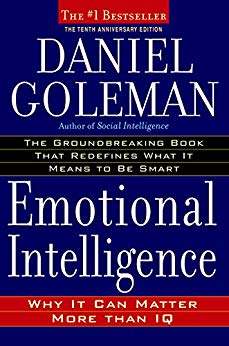

This article is an excerpt from the Shortform summary of "Emotional Intelligence" by Daniel Goleman. Shortform has the world's best summaries of books you should be reading.
Like this article? Sign up for a free trial here .
Freud said, “To love and to work are the twin capacities that mark full maturity.” Goleman would most likely add “to learn” and “to take care of yourself and others” to that list, and emotional intelligence is the key to loving, working, learning, and taking care of yourself and others to the best of your abilities.
Since social pressures are no longer the main catalyst for marriage, much more importance is placed on the emotional bond between two people. The current trend in divorce rates suggests we need a little more emotional intelligence in our marriages.
- In 1890, about 10% of all American marriages ended in divorce. In 1920, the rate went up to 20%. It went up to 30% in 1950, and 50% in 1970. By 1990, it shot up to 67%.
One primary factor in the dissolution of marriage is differing expectations, and it all starts with how we raise children to approach emotions based on their sex.
Differing Expectations in Emotions in Relationships
In couples experiencing marital distress, typically the woman wants to engage with her husband, and the man routinely withdraws from his wife. This stems from the two different emotional intelligence and emotional realities in a heterosexual couple, his and hers.
Learning to Be or Not to Be Emotional
Emotional differences in relationships may be partially biological, but they are undeniably social. Boys and girls are taught different lessons about how to handle their emotions.
- Generally, parents discuss emotions more with daughters than sons, excepting anger. Parents display a wider array of emotions to daughters. When parents make up stories for preschool-aged children, they typically use more emotion words for daughters than sons. Mothers discuss emotions with daughters, and discuss them in greater detail than with sons.
- Girls are also typically faster to develop language skills than boys, which gives them more experience articulating their feelings and using words instead of physical methods of resolving conflicts or communicating feelings.
- Boys are not encouraged to verbalize their feelings, and they’re not usually taught how–this can cause them to develop a blindness to their own emotional states and others’.
- Sons are more likely to receive detailed stories and instructions on anger. This is perhaps because boys and girls drift into different ways of handling anger at the onset of puberty.
- At 10, approximately the same percentage of boys and girls are described as overtly aggressive and prone to open confrontation. By 13, girls have learned to use different tactics to express anger, tactics like gossiping, ostracizing, and indirect confrontation. Boys at the same age still deal with anger through open confrontation.
And there are differences in how girls and boys form relationships with others, even in childhood.
- Girls typically play together in small groups, emphasizing minimal hostility and maximum cooperation. Boys generally play in larger groups, emphasizing competition.
- If a girl gets hurt while playing a game, the game ceases and all the other girls convene around the injured girl and try to help. If a boy gets hurt during a game, he’s expected to remove himself and let the game continue.
- Girls consider themselves a part of a group, and feel threatened by any rift in their relationships; boys are encouraged to be autonomous, strong-minded individuals–loners who sometimes hang out with other loners–and are threatened by any challenge to that autonomy.
When the Kids Grow Up and Have Relationships
These lessons result in different expectations of emotional intelligence in relationships and abilities in adulthood:
- Women seek emotional connection in conversation, while men prefer to talk about “things.” In one study, the most important thing for a woman’s marriage satisfaction was good communication between her and her husband.
- Women are better at picking up verbal and nonverbal cues, and at expressing and articulating their feelings. Men are adept at minimizing “weak” emotions such as hurt, fear, guilt, or vulnerability.
- In terms of marriage, this means women come prepared to be the “emotional managers,” while men lack an understanding of how fundamental emotions are to the survival of a relationship.
One researcher found that in the dating phase men are much more likely to participate in the emotionally connected talking that women crave–but as the relationship goes on, men spend less time talking this way and want to connect through activities.
Because men have less capability with registering and interpreting others’ emotional cues, husbands don’t notice their wives’ emotional states until they’re more intense–a woman has to be that much sadder to get her husband to notice, let alone ask what’s making her sad. This can be perceived as low emotional intelligence in relationships. Women, as the emotional manager of a relationship, can get burnt out not only by trying to manage their male partner’s emotions, but by having to manage their own stronger and more neglect emotions by themselves.
Ironically, because men generally have a more shallow understanding of emotions, husbands also generally see their relationships in a rosier hue than their wives–everything from sex to family relationships to finances seem on average better to men than to women. Women generally complain more vocally about their marriage than men, especially in less satisfied couples. This is precisely because they are trying to work out emotional issues and resolve grievances in their role as emotional manager. No wonder men and women feel differently about emotional intelligence in relationships!
———End of Preview———

Like what you just read? Read the rest of the world's best summary of Daniel Coleman's "Emotional Intelligence: Why It Can Matter More than IQ" at Shortform . Learn the book's critical concepts in 20 minutes or less .
Here's what you'll find in our full Emotional Intelligence summary :
- What are emotions? Why do we have them?
- What is emotional intelligence? Why is it important?
- How do you manage your own emotions? Anger, anxiety, and sadness?
- How can you approach your relationships with more emotional intelligence?
- How can you teach your children emotional intelligence?
- How can emotional intelligence boost your career?






